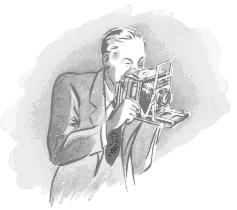| View previous topic :: View next topic |
| Author |
Message |
vincent
Joined: 06 Aug 2009
Posts: 13
Location: Bristol, Maine, USA
|
 Posted: Thu Jan 28, 2010 4:24 pm Post subject: design of Graflex...just curious Posted: Thu Jan 28, 2010 4:24 pm Post subject: design of Graflex...just curious |
 |
|
Was the Graflex designed specifically for the press market? If so, why were movements included when most press work appears to have been hand held and grab shots. The camera would have been lighter and cheaper without the movements, yes?
_________________
...I am constantly amazed... |
|
| Back to top |
|
 |
1banjo
Joined: 16 Nov 2008
Posts: 492
Location: kansas
|
 Posted: Thu Jan 28, 2010 9:47 pm Post subject: Posted: Thu Jan 28, 2010 9:47 pm Post subject: |
 |
|
hey vincent
I thank most of the movements is to let you use wide angle lens with the
dropping the bed & rise/ backward tilt the only other is side shaft
mostly straight forward hand held and grab shots
banjo |
|
| Back to top |
|
 |
Les
Joined: 09 May 2001
Posts: 2682
Location: Detroit, MI
|
 Posted: Thu Jan 28, 2010 10:57 pm Post subject: Posted: Thu Jan 28, 2010 10:57 pm Post subject: |
 |
|
That depends on the model. I don't think the Top Handle Speed was at all, but the press corps adopted it because it was lighter and faster than a Press Graflex.
The Pre-Ann was definitely a press camera, and it has the least amount of movement, you even need an attachment to shoot 90mm lenses without the bed showing in the shot. They added rise because its just as easy to punch an oval hole in sheet metal as it is a round one, and if you look at the pretty plate cameras they made before the Speed (RB Cycle Graphic, etc) rise is pretty standard in this kind of camera.
By the time the Anniversary rolls around, it's a press camera plus it's good enough for every day press work, plus the occasional architectural shot.
The Pacemaker added more (mainly tilts), because it's post war euphoria and everybody expects more.
The Super added more swings and shifts because by 1958 the Press Corps had moved onto the TLR, with some Leica and Contax thrown in there for good measure.
_________________
"In order to invent, you need a good imagination and a lot of junk" Thomas Edison |
|
| Back to top |
|
 |
glennfromwy
Joined: 29 Nov 2001
Posts: 903
Location: S.W. Wyoming
|
 Posted: Fri Jan 29, 2010 12:57 am Post subject: Posted: Fri Jan 29, 2010 12:57 am Post subject: |
 |
|
The Speed Graphic was always much more than a press camera to be carried by news reporters. Many, if not most, ad agencies, fashion photgraphers, etc. used them. Many were used hand held because of the very versatile design. Portrait photographers usually had them on a tripod, either in a studio or on location, as did product photographers and others who demanded maximum sharpness working with artificial light. A lot of great architecture and interior photos have been taken with the Speed, despite the lack of movements. The list of uses is endless.
_________________
Glenn
"Wyoming - Where everybody is somebody else's weirdo" |
|
| Back to top |
|
 |
BrianShaw
Joined: 24 Dec 2006
Posts: 71
Location: Los Angeles, CA
|
 Posted: Tue Feb 02, 2010 4:42 pm Post subject: Posted: Tue Feb 02, 2010 4:42 pm Post subject: |
 |
|
| It is very common in product design to either be versatile or highly-specialized. Graflex smartly opted for designing with a limited amount of versatility. Press photography, by its essential nature, is versatile. (as Glenn so aptly said before me) |
|
| Back to top |
|
 |
IanG
Joined: 04 Aug 2006
Posts: 74
Location: United Kingdom
|
 Posted: Sun Feb 07, 2010 1:14 pm Post subject: Posted: Sun Feb 07, 2010 1:14 pm Post subject: |
 |
|
Remember taht the original Reflex Graflex's were similar to earlier European camera's from a whole variety of manufacturers, which sometimes more features.
The Graphics where made to be lighter than many European press cameras but that meant cutting back on features like revolving backs and movements.
But there was a major change in Press work in Europe in the 1930's with a switch to smaller formats, and the rise of Pictorial News Magazines first in Germany and as refugees led Hitler the UK and and this type of change took place later in the US, and more as a consequence of reportage of WWII.
So during and after the war the way images were used by the US media changed, the single image was being replaced by the photo-story, and camera's needed to be more flexible.
The pre-WWII (1938/9 Linhof was a fore taste of the way Press camera's would change, but even that is old fashioned in design compared to the Swiss Kern Bijou cameras of the late 1920's.
So the Pacemaker Speed & Crown offered more, but in reality they should have gone further and introduced the Super Graphic's far earlier.
Ian |
|
| Back to top |
|
 |
|
|
You cannot post new topics in this forum
You cannot reply to topics in this forum
You cannot edit your posts in this forum
You cannot delete your posts in this forum
You cannot vote in polls in this forum
|
Powered by phpBB © 2001, 2005 phpBB Group
|


